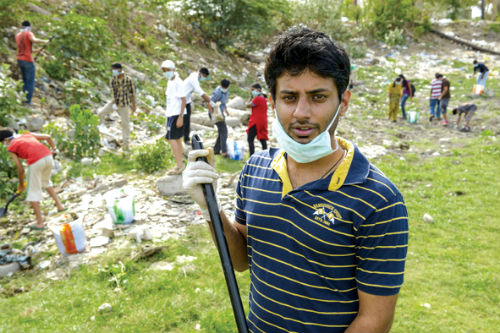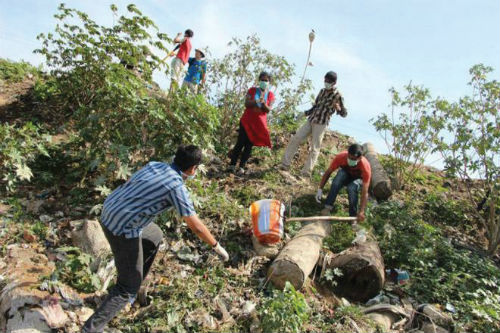Registered with the Registrar of Newspapers for India under R.N.I 53640/91
Vol. XXVII No. 11, September 16-30, 2017
Cleaning lakes – his passion
by N.S. Parthasarathy

Arun Krishnamurthy.
Environmental conservation has been a much-discussed subject of vast scope and has naturally meant many things to many people. To Arun Krishnamurthy, it is cleaning lakes. He has not only chosen this specific aspect of environmental conservation, but has engaged in direct action on this aspect over the last ten years with dedication and tenacity.
Krishnamurthy, in his early thirties, graduated in microbiology, but had dreamed from his boyhood of saving lakes and ponds in his neighbourhood in the outskirts of Chennai where he was brought up. In his time, boys of his age entertained more exciting aspirations and interests, but Arun was obsessed with the state of unclean lakes and ponds in his neighbourhood. He started – over-ambitiously as it may have seemed then – the Environmentalist Foundation of India (EFI), an NGO, in 2007 to mobilise support for conserving environment.
EFI’s web-site refers to several programmes, each of which is as important as the other. The holistic village development programme which involves large scale sensitisation and environment volunteering efforts is Green Gramam. Through this project EFI adopts villages and converts them into eco hubs. Green Gramam is executed through volunteers from the village.

Volunteers at work with Arun
Cities generate enormous quantities of waste every day, and with no appropriate waste management system in place, our landfills are mounting in size. Through their waste management programme, EFI aims at sensitising people to segregate their waste. Post-segregation, the waste is recycled and not sent to the landfill.
Waste generated at home is a big challenge. EFI teaches households how to convert this waste into nourishing manure. Herbs and saplings can be treated with the compost nutrition. From as little as kitchen waste to something as big as collection of apartment complex waste, EFI offers help in these tasks.
The most impactful of all programmes seems to be EFI’s water-body clean-up campaign. Under this programme the organisation adopts a beach, lake or any water body on a voluntary basis. The water body or beach with its periphery are cleaned, strengthened and restored to its original capacity and beauty. The cleaning process involves massive removal of physical garbage followed by scientific lab testing of the water samples repeatedly to check contaminant and pollutant levels. The lake bed is de-silted and the silt is deposited on the bunds followed by a major bund-strengthening programme. The levelled bund is planted with native species of saplings which offer extra support to the bund. A small wetland is created at one corner of the lake to filter out the incoming waste. The wetlands act as substrate filters; plants like water hyacinth are grown in this part alone to ensure filtration.
I met Arun Krishnamurthy in his office in Besant Nagar. It is a modest space with a dedicated team of young qualified professionals who seemed fired by the importance of their mission. EFI does not get foreign funds but operates with domestic institutional philanthropy. A lean organisation with a vast army of ground level volunteers at hundreds of select sites all over India ensures a low cost of delivery of services. And there can be no greater assurance to donors than what EFI has done.
By dint of the results seen on the ground and by the low cost of accomplishing them, Arun shows no sign of worry about monetary resources needed for the vast operations that EFI is tackling today. It strategises, guides, supervises and monitors hundreds of sites all over the country – Chennai, Pondy, Thanjavur, Tirunelveli, Bengaluru, Kolkata, Delhi and more. At present, there are 83 water bodies in these areas that are being cleaned up and renewed by about 70,000 volunteers. Cleaning cannot go on endlessly; the objective is to make cleaning unnecessary. Considering that it is a difficult, long process needing persistent effort, it takes about ten years to restore the water body and make it sustain itself with minimal maintenance and cleaning. Such a self-sustaining state is the aim and that mark has been attained in 26 out of the 83 sites in the country over the last ten years, says Arun. In these sites the water is fresh with no pollution, with aquatic life restored. In each of the selected sites there is action by the community participants every eight weeks which entails a supervisory visit from EFI. Progress is quantified and fed into the central data base. Each community is encouraged to work closely with local sub-district or panchayat officials. Volunteers bring their ideas, efforts and commitment and no one is forced or “supervised”. The community decides what to do and guidance and tool kits are supplied free of cost to them by EFI. Thus, ownership and commitment to the cause is created. Arun says that it is important to understand the local social and cultural dynamics of each place and work within it to get results. Each site is different and has its own characteristics, he says.
EFI is extending into distant areas like Sri Lanka and seems to be going for a larger geographical spread. I sought clarification on the advantage of spreading their resources thin over a wide expanse compared to a more nuanced and focused approach in a select region or area and soaking it with every available resource. Arun says that the availability of a proven model and the capacity to adapt to locally articulated needs, initiatives and styles, built into the model, enable EFI to replicate the model even in outlying locations without difficulty and loss of effectiveness. It still seems debatable whether a large spread is desirable over compactness and completeness area by area, but Arun and his colleagues are shrewd enough to be aware of the probability and need for such a strategic course correction in the future.
EFI’s programmes are so wide and comprehensive that you wonder if meaningful and sustained attention is feasible on so wide a range of objectives. Their conservation efforts include the following: lake conservation, herb restoration/native species plantation, creating urban eco-responsibility, composting, setting up bio-diversity parks in schools, animal care, sparrow reintroduction, youth camps and mass awareness through media. Would EFI be better off devoting its energies and resources on select critical programmes instead of trying to do too many things all at once?
Even with a fine working model backed by sound organisation it takes many years to restore a waterbody to its natural state of life-giving cleanliness when it does not need any more massive cleansing attention. And there are thousands of such water bodies in every State. As such, cleaning as a post-event correction would be endless, with no closure in sight. While cleaning as a corrective measure is necessary, simultaneous massive efforts to educate people to generate less waste and to dispose of them in a responsible manner would, ideally, reduce the need for cleansing itself, making it eventually even unnecessary. EFI’s campaign should shift gradually to utilise its model and expertise to bring about a behavioural transformation among waste generators. Arun’s present effort is, no doubt, having the incidental effect of sensitising a vast army of volunteers in the country to the need for protecting natural resources and to more responsible habits in generating and disposing waste. Their example would have a contagious influence on their fellow citizens.
Philanthropic institutions are looking for good causes and committed implementation. And EFI under Arun Krishnamurthy has a worthy cause, a working model that lends itself to easy replication, low delivery costs and a team of young men and women charged with missionary zeal. That should make for a synergistic partnership.

